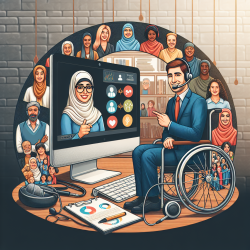Key Components of the Distance Support Model
The model described in the research focuses on several essential components that ensure effective distance support for special education students:
- Parent Preparation: Conducting open-ended interviews and functional assessments to understand the student's needs and home environment.
- BCBA Program Preparation: Reviewing IEP goals and modifying them for distance learning, including data collection methods and reinforcement strategies.
- BI Training: Training behavior interventionists in distance support strategies, including rapport building and reinforcement.
- Distance Support Intervention Sessions: Structuring sessions to include rapport building, academic support, and behavior intervention.
- BCBA Supervision and Parent Support: Providing ongoing supervision and creating video content to support parents.
Implementation Strategies
Implementing this model requires careful planning and collaboration:
- Advocacy: Advocate for the continuation of services by presenting a clear framework and securing agreements with school districts.
- Collaboration: Work closely with school districts and other agencies to ensure consistent and effective service delivery.
- Data-Driven Decisions: Use data to refine and adapt the support model, ensuring it meets the evolving needs of students and families.
Preliminary Results
Early implementation of this model has shown promising outcomes:
- Increased student engagement and task completion.
- Reduced behavioral issues reported by parents.
- High levels of parent and student satisfaction.
Recommendations for Practitioners
To effectively implement this model, practitioners should:
- Engage in continuous professional development to stay updated on best practices in distance learning and behavior analysis.
- Collaborate with other professionals and agencies to share resources and strategies.
- Regularly collect and analyze data to make informed decisions about service delivery.
By following these guidelines, practitioners can help ensure that special education students receive the support they need, even in a distance learning environment.
To read the original research paper, please follow this link: Advocacy, Collaboration, and Intervention: A Model of Distance Special Education Support Services Amid COVID-19










